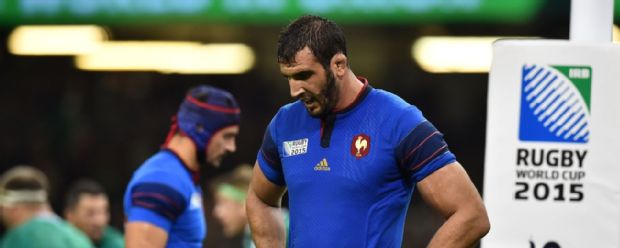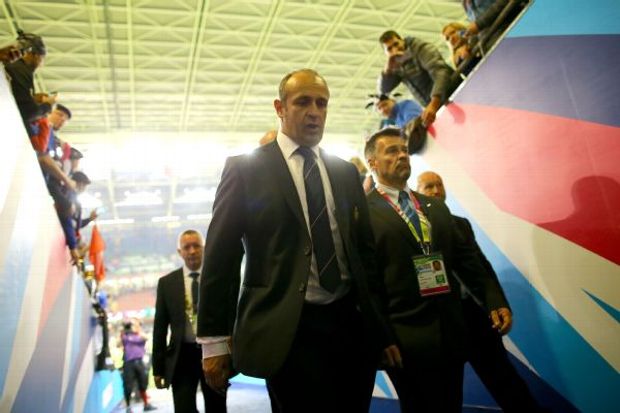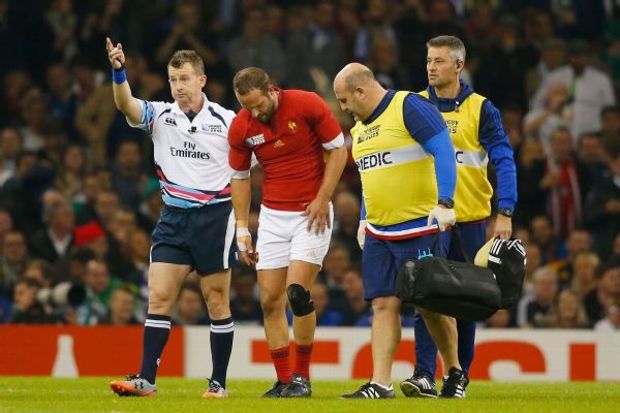|
France
The future of French rugby looks bleak after World Cup humiliation
Martin Gillingham
October 28, 2015
 © GABRIEL BOUYS/AFP/Getty Images The cover of the Monday morning edition of French rugby newspaper Midi Olympique was all black; a suitable double entendre given that less than 48 hours earlier under the Millennium roof the hommes in bleu had been smashed by the men in black. If you think the mood's been grim in England since their premature exit then you should try the reaction to France's failings. "How do we get out of this crisis?" was the cover line on this week's "Midol". Watching France fold in the quarterfinal was a bit like suffering the agonising final minutes of Jerry Bruckheimer's depiction of the life and death of fearless Irish reporter Veronica Guerin: we all knew how the story was going to end but whether it be morbid curiosity or hopeless optimism something just kept us rooted to our seats. In the end of course, Cate Blanchett took the bullet and France were savagely beaten. Some observers hailed the All Blacks as "the greatest team ever"; a more critical judgment would be that France, one of the worst, made them look rather better than they are. The French and English unions now find themselves in similar places; picking over the wreckage of disastrous World Cup campaigns while trying to learn the lessons. There is, though, one fundamental difference in their positions: England's coach Stuart Lancaster has literally taken to the hills while a review panel decide his fate; meanwhile in France, Philippe Saint-Andre is already back home thumbing through the situations vacant columns. He's already gone having known several months before the tournament had started that it was to be his last. On the face of it, announcing that your national coach's contract shall not be renewed ahead of the World Cup and naming his replacement is barking mad. But that's exactly what France did during the spring. Toulouse's Guy Noves, who 12 months earlier had been written off as past it and even a bit of a dinosaur after pushing a bloodied and heavily concussed Florian Fritz back on to the pitch in a crucial Top 14 knockout match, is the "new" man. Such advance planning clearly suits the agendas of the French clubs - no need for contingency plans in case their coach gets poached by the federation early in the new season - but it did expose Saint-Andre who, stripped of his authority, was fair game to the peculiarly French penchant for revolt. It had happened four years earlier when Marc Lievremont was similarly exposed in New Zealand and, hey presto, the rumours in the days that led up to the Cardiff quarterfinal were that Saint-Andre too was being undermined.  © Richard Heathcote - World Rugby/World Rugby via Getty Images So where else did it all gone wrong and as Midol asks, Comment sortir de la crise? On the micro level, selection has been flawed. And that starts with the French federation's selection of Saint-Andre. Terrific player, delightful bloke, shocking coach. He certainly didn't get the job on merit. Given the raw materials at his disposal during his two years at Toulon he largely failed. The club's fortunes peaked in his first season with an extra-time Top 14 semifinal defeat by Clermont and reached a low point 12 months later when they finished eighth in the league phase. In the four seasons that have followed, Bernard Laporte took the first to get Toulon back into Europe's premier competition before going on to win it three times in a row. Like Lancaster, Saint-Andre stands accused of selection flaws. Perhaps his greatest is the blind faith placed in Frederic Michalak. The fly-half's image limping off the pitch and into the dark of the tunnel 11 minutes into the quarterfinal humiliation having just given away the first try when his clearance kick was charged down is the perfect pictorial epitaph to Saint-Andre's reign. Laporte has never properly trusted Michalak at Toulon - he didn't start any of their European or Top 14 final victories - but it was clear, fitness permitting, he was Saint-Andre's first choice from the moment he produced one of those sparking but all too rare performances in the 49-10 win against a second string Argentina on the June 2012 tour.  © Laurence Griffiths/Getty Images Another case in point is Mathieu Bastareaud. He of the thundering hit but with a turning circle as slow and wide as The Queen Mary's. Over the past couple of years when assessing the prospects of France ahead of any given international match how often do you hear pundits proffer, "It depends which France team turns up today?" Not only is that a lazy and hackneyed observation it is also fundamentally incorrect. Ever since Saint-Andre has been in charge we've known exactly which France team is going to turn up: biff, bash, bosh, PSA's France. Read Mathieu Bastareaud. Has there ever been an international rugby team so clearly at odds with the character of its coach as a player? Michalak's parting shot from international rugby - the indications from Toulon are that having now got two other fly-halves on the payroll Laporte will happily release him from the remainder of his contract - was that France must take drastic action to arrest the slide of its national team. He's got a point. In the southern hemisphere, once prestigious domestic competitions like South Africa's Currie Cup are fast assuming developmental status while Super Rugby, as wonderful as it is, is an adjunct to the international game. In Europe, and particularly in France, there is more conflict.
I adore the Top 14 and am its staunchest supporter but there is something fundamentally wrong when this season's competition runs to the end of June at the same time as the national team is supposed to be touring Argentina. The failure of the northern hemisphere at this World Cup has shown that France can no longer gauge its progress according to their performance in the Six Nations. The November internationals when southern hemisphere rivals come to Europe fatigued by a long season and the unparalleled demands of The Rugby Championship is not the purest test either. What is are the June tours when European teams cede home advantage and meet World Cup semifinalists or better in their own back yard and closer to their peak. Those happen in 2016 over the second, third and fourth Saturdays in June. In France, those three weekends clash directly with the centre piece of the domestic season with the best six teams involved in the Top 14 play-offs. The final is scheduled to take place at Barcelona's Nou Camp on the evening of Friday June 24. It just about sums things up. So what chance has French rugby of finding immediate solutions to its club vs. country conundrum? I don't think I need to answer that one. © ESPN Sports Media Ltd.
|
Live Sports
Communication error please reload the page.
-
Football
-
Cricket
-
Rugby
-
- Days
- Hrs
- Mins
- Secs
F1 - Abu Dhabi GP
Abu Dhabi Grand Prix December 11-131. Max Verstappen ()
2. Valtteri Bottas (Mercedes)
3. Lewis Hamilton (Mercedes)
4. Alexander Albon ()
5. Lando Norris ()
6. Carlos Sainz Jr ()
-
ESPNOtherLive >>
Snooker - China Open
Tennis - Miami Open

